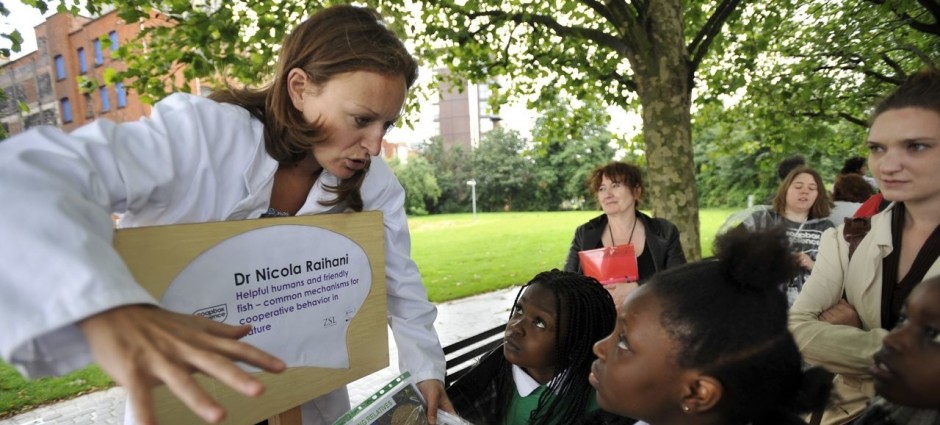 Gillian Hill is currently a PhD student at the University of Buckingham. She is a psychology researcher and teacher who hopes to share her experiences as a second career scientist in order to encourage others to take a leap into science. Here, Gillian explains how redundancy and a dissatisfaction with non-evidence based decision making led her to seek out science and how family and friends’ encouragement helped her on her way. Meet Gillian on her Soapbox at the Milton Keynes event on 9 July, where she tells us about her journey into science so far, “From Elephants to Uh-ohs: the Psychology of Insight”.
Gillian Hill is currently a PhD student at the University of Buckingham. She is a psychology researcher and teacher who hopes to share her experiences as a second career scientist in order to encourage others to take a leap into science. Here, Gillian explains how redundancy and a dissatisfaction with non-evidence based decision making led her to seek out science and how family and friends’ encouragement helped her on her way. Meet Gillian on her Soapbox at the Milton Keynes event on 9 July, where she tells us about her journey into science so far, “From Elephants to Uh-ohs: the Psychology of Insight”.
SS: How did you get to your current position?
GH: Long boring answer: I took voluntary redundancy from a local authority post during austerity cuts and looking for a new career direction, found a two-year BSc Psychology degree at the University of Buckingham. For my final dissertation project I investigated personality and insightful problem solving in Elephants. This led me to question the research that has been carried out in human insight, which I am now exploring for my PhD.
Short answer: I have had, and still get relentless encouragement and support from my husband, children, friends and colleagues. If I can do this aged 41 then anyone can.
SS: What, or who, inspired you to get a career in science?
GH: Initially I think my attraction to science was a reaction to the frustration at the lack of evidence-based decisions made within local authorities. As I progressed though my undergraduate degree my lecturers’ passion for the subject and particularly my project supervisor, Dr. Shelly Kemp convinced me that a career in science was perfect for me.
SS: What is the most fascinating aspect of your research/work?
GH: I think the variety of my working life. I really enjoy meeting with diverse participants when I am collecting data for my experiments. In contrast I also love the time I spend reading and coming up with research ideas that then develop into the studies I carry out. I also love that I get to share my enthusiasm with undergraduates in the teaching that I do. Watching students graduate and hearing about their next steps is really rewarding.
SS: What attracted you to Soapbox Science in the first place?
GH: I think it is really important that we highlight the diverse and accessible nature of science and scientists. My hope is that events such as Soapbox Science mean that anyone can picture themselves being a part of this exciting community, whether as a researcher, participant or audience for research findings.
SS: Sum up in one word your expectations for the day – excitement? Fear? Thrill? Anticipation?
GH: Uh-oh!
SS: If you could change one thing about the scientific culture right now, what would it be?
GH: I think we need more diverse role models, and I don’t just mean in the recognised sense of sex, age etc. I feel the stereotype of the brilliant, perfect researcher solely dedicated to their career in science is unrealistic. We need to celebrate all aspects of being a scientist and be confident enough to talk about our mistakes and setbacks as well as successes. If this were the case I think it would be less daunting for those embarking on a career in science.
SS: What would be your top recommendation to a female PhD student considering pursuing a career in academia?
GH: I will simply share the advice I give myself regularly: just keep going, we will get there!
